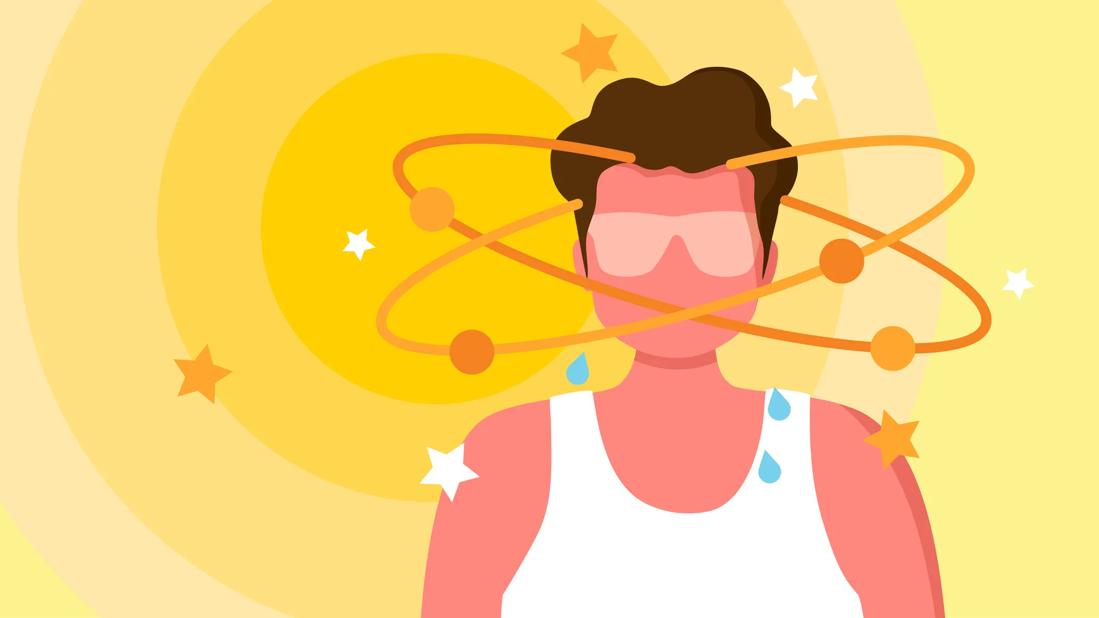This ‘poisoning’ is actually a severe sunburn that seems similar to an allergic reaction

If you have sun poisoning, you may feel that familiar tenderness you associate with the average sunburn — the red shoulder or thigh that momentarily turns white when you press a finger against it.
Advertisement
Cleveland Clinic is a non-profit academic medical center. Advertising on our site helps support our mission. We do not endorse non-Cleveland Clinic products or services. Policy
But then, things take a turn for the worse after a few hours. You develop a blistering rash that itches and burns like mad. You start getting the chills and/or extremely thirsty. You might even experience nausea.
Sun poisoning may not be exactly what you think it is, but it’s certainly a cause for concern.
Even though “sun poisoning” isn’t a formal medical term, we’ve all heard of it. Family medicine doctor Matthew Goldman, MD, says it often mimics a flu bug or allergic reaction.
As a result, you can find yourself shivering in bed with a headache, fever and chills — all wrapped up with the redness, pain and sensitivity of a sun-scorched skin patch.
Depending on the severity, sun poisoning can cause a range of symptoms. Common signs of sun poisoning may include:
When you have sun poisoning, you’re not actually poisoned by UV (ultraviolet) rays. What you’re experiencing is intense pain and other reactions from the damage dealt to your skin. If you’re experiencing sickness, nausea, dizzying or general illness, chances are, this is a result of being severely dehydrated.
Advertisement
If you experience any of these symptoms, you should drink plenty of water and electrolytes to keep yourself hydrated and clear-minded.
So, how long does sun poisoning last? The pain and skin healing can continue for a few weeks, depending on the severity of the burn. If you scratch or pick at the burn, you run the risk of getting an infection. If you notice any bleeding or oozing, you should see a doctor immediately because it could be a sign of infection.
There are a lot of possible causes for sun poisoning and, in some cases, it has no known cause. Sun poisoning is more likely to occur in some people than others, such as:
Certain pre-existing conditions, medications and/or chemical exposure may predispose someone to sun poisoning. This can include:
Treatment for sun poisoning can include:
“Sun poisoning affects people differently, so doctors tend to focus treatment on a person’s specific symptoms,” clarifies Dr. Goldman.
To prevent sun poisoning, you want to take the same precautions that help you avoid sunburn. Here are some important tips to follow the next time you’re exposed to the sun:
It can be easy to spend too much time out in the sun and wind up with a bad sunburn that may appear to be sun poisoning.
Advertisement
“If you have symptoms of sun poisoning, it’s important to see your medical provider,” stresses Dr. Goldman. “After examining you, they can determine the severity of the problem, as well as the best treatment.”
Advertisement

Sign up for our Health Essentials emails for expert guidance on nutrition, fitness, sleep, skin care and more.
Learn more about our editorial process.
Advertisement

Several conditions, like vitiligo and fungal infection, can cause a loss of pigmentation, leading to white spots or patches on your skin

This cooling gel can help soothe sunburned skin, but it can’t cure the burn

You know it’s not good if you’ve been holding onto it for more than three years or if it’s changed in color, consistency or smell

Look for a UPF rating of 50+ for optimal protection against UV rays

A sunburn will leave you itchy and red, while sun poisoning can feel like an allergic reaction

A cool shower, aloe vera gel, anti-itch treatments and cool compresses can provide fast sunburn relief

SPF stands for ‘sun protection factor’ — it’s a measure of how much protection you’re getting before a sunburn is possible

When outside, protect your skin from damaging UV rays with a fresh layer of sunscreen at least once every two hours

Even small moments of time outdoors can help reduce stress, boost mood and restore a sense of calm

A correct prescription helps your eyes see clearly — but as natural changes occur, you may need stronger or different eyeglasses

Both are medical emergencies, but they are very distinct events with different causes